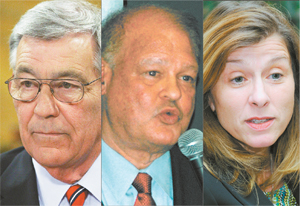 Northern Arizona businessman Buz Mills has spent nearly $3.2 million in his Republican campaign for governor, but only about 4 percent of his money has come from individual donors, according to his latest financial reports.
Northern Arizona businessman Buz Mills has spent nearly $3.2 million in his Republican campaign for governor, but only about 4 percent of his money has come from individual donors, according to his latest financial reports.
Mills’ largely self-funded campaign has outspent publicly funded Gov. Jan Brewer by millions of dollars. Even so, recent polls show Mills as the distant second-place challenger to Brewer in the GOP primary that also includes state Treasurer Dean Martin and Apache Junction resident Matthew Jette.
Other traditionally funded candidates for statewide office may not have the financial wherewithal Mills does, but the latest reports filed June 30 showed they’re in a position to far outspend their Clean Elections foes, thanks in large part to a recent U.S. Supreme Court decision to block matching funds this election cycle.
Clean Elections candidates who already have name identification, like Brewer, Secretary of State Ken Bennett or former Maricopa County Attorney Andrew Thomas, may not suffer as much for lack of matching funds, observers said.
But others, such as the Republican treasurer candidates who are running against the well-funded Doug Ducey in the primary, have a problem on their hands, said Democratic lobbyist Barry Dill.
“It would seem that most other down-ballot Clean Elections candidates don’t have name ID. And without money, it’s going to be hard to mount a credible campaign,” Dill said of those being outspent by traditionally funded candidates.
Ducey, the former CEO of Coldstone Creamery, has raised $373,000 so far in the race, while his Clean Elections’ opponent, Sen. Barbara Leff of Paradise Valley, will be capped at $91,645 in public funding.
Ducey also is far outspending traditional candidate Sen. Thayer Verschoor of Gilbert, who has raised only $35,000. The other traditional candidate, Ted Carpenter, has yet to submit his financial report.
On the other side of the aisle, Democrat Andrei Cherny has already raised $502,000. Most of that money has gone unspent and will be used in the general election because he does not have a primary opponent.
Funding disparities also are evident in the attorney general races.
Republican Tom Horne has raised about $325,000 so far. He collected about $110,000 of that between January and May of this year.
Thomas, his primary opponent, can only spend $183,311 in Clean Elections money, in what is proving to be a vicious campaign.
Democrat Felecia Rotellini, who is also running for attorney general, has raised a total of about $290,000; approximately $173,000 of that was collected during the current reporting period.
Democrats Rep. David Lujan of Phoenix and Vince Rabago of Tucson are both running for attorney general with public financing and will also be capped at $183,311 in Clean Elections funding.
Even without matching funds, Lujan said he isn’t worried about the fundraising discrepancy with Rotellini, and said Clean Elections will give him an advantage in the general election if he wins the Democratic nomination.
“Everyone’s going to spend whatever cash they have on hand to win the primary. And then if I’m the nominee out of the primary, I get a new check from Clean Elections a couple days after the election to fund the general, whereas a traditionally funded candidate would have to raise a lot of money in a very short period of time,” Lujan said.
Of the five candidates for state superintendent of public instruction, only Democrat Penny Kotterman is running as a traditional candidate. She has raised $111,000. The Clean Elections candidates in the race will be capped at $92,000.
The U.S. Supreme Court’s June 8 decision to block the distribution of matching funds threw a number of high profile campaigns into disarray just weeks before candidates were to start receiving Clean Elections money.
The most high-profile race to be impacted by the decision was the governor’s race, where the Clean Elections opponents are going up against free-spending Mills.
Camilla Strongin, Mills’ campaign manager, said Mills has relied primarily on his own personal wealth – his June 30 campaign finance report shows he only raised $83,000 from individual donors – and has instead focused far more on voter outreach.
Brewer’s dominant poll numbers are due to the boost she got after signing S1070, Strongin said, and Mills has plenty of time to make up the difference.
“We are certainly cognizant of … the perception that 1070 has had with the electorate. But it’s early. We’ve got a lot of time before early voting starts and before Aug. 24,” Strongin said.
Mills’ campaign finance report shows he paid nearly $2.2 million to the Symington Group, a consulting firm of which Strongin is a partner. Strongin said the majority of the money was spent on television ads and mail pieces.
Luige del Puerto contributed to this story

 Arizona Capitol Times Election Coverage Your Inside Track to Arizona Elections
Arizona Capitol Times Election Coverage Your Inside Track to Arizona Elections
2 comments
Pingback: Big money flowing for many privately funded candidates | phoenix.rssible.com
Pingback: Twitter Trackbacks for Arizona Capitol Times » Blog Archive » Big money flowing for many privately funded candidates [azcapitoltimes.com] on Topsy.com